Executive Summary
Among the most stunning strategic successes, NYMC unveiled its new state-of-the-art Clinical Skills and Simulation Center, developed and populated BioInc@NYMC—the mid-Hudson Valley’s only fully-equipped biotechnology incubator on a health sciences college campus, reinvigorated NYMC’s tradition in nursing education by launching a new registered nurse (R.N.) to Bachelor of Science (B.S.) in Nursing Program and opened New York State’s first new dental school in more than 50 years.
We implemented campus connectivity through the creation of new walkways and a new driveway, and updating campus buildings including 7 Dana Road and 19 Skyline Drive. In addition, we elevated the College’s brand recognition, completing NYMC’s first branding and strategic messaging campaign, which included launching a new website and creating new logos. We followed this up with a comprehensive initiative that streamlined all of our communications.
In research, we have developed bridge and seed funding programs that have been extremely successful in enabling investigators to compete for new and continued extramural research funding. Funds were also contributed to establish a cardiovascular translational science institute and a child health translational science institute. We have hired new faculty who have strengthened the overall biomedical research mission of the College. The College has also appointed a vice president for research to work with the deans and faculty to promote and strengthen basic, translational and clinical research and nurture the scientific community particularly in the area of biomedical resources to ensure NYMC remains competitive.
During the past five years, the College increased enrollment numbers across all schools, grew our academic programs, while increasing funds committed to student scholarships by more than $2 million. Newly launched programs include a Master of Science in Biostatistics as well as an advanced post-master’s Certificate in Pediatric Dysphagia in the School of Health Sciences and Practice (SHSP). New programs in the Graduate School of Basic Medical Sciences (GSBMS) include a Master of Science in Clinical Laboratory Sciences, a Master of Science in Biomedical Science and Management and a Professional Science Master’s (PSM) program. Securing more choice clinical rotations for our students in the School of Medicine, NYMC established a long-term academic affiliation agreement with Westchester Medical Center Health Network. Finally, the College brought in new leadership, including new deans, vice presidents and chairs and recruited widely-recognized academic researchers.
With the 2015-2020 Strategic Plan coming to an end, the College required a new road map to address the rapidly changing health care fields and ever evolving higher education landscape. Designed to meet the College’s great challenges and exciting opportunities, this forward-looking plan will take NYMC into the next era of growth.
The Planning Process
Drawing input from across the College’s varied stakeholders, New York Medical College’s Strategic Plan: 2021 – 2026, is the result of more than a year of hard work including numerous College-wide surveys and feedback sessions, copious collaborative strategy meetings and multiple draft versions.
By intention, the plan is the product of an inclusive planning process—set into motion in the fall of 2018, when Edward C. Halperin, M.D., M.A., chancellor and chief executive officer, charged the College with initiating a college-wide strategic planning initiative, to be completed by 2020.
NYMC’s 2021-2026 Strategic Planning Initiative was launched in early 2019, under the leadership of Strategic Planning Chair Jennifer Riekert, M.B.A., vice president of communications and strategic initiatives, and Co-chair Dana Mordue, Ph.D., associate professor of microbiology and immunology and vice chancellor for Middle States Accreditation. The Strategic Planning Executive Committee comprised of faculty, staff, administration, leadership, board of trustee members and students, unveiled the strategic planning process (below), detailing the steps involved as we, the NYMC community, collectively STRIVE toward the future:
S
Strategy:
Track the progress achieved via the existing strategic plan and develop a strategy for creating the 2021-2026 plan.
T
Team:
Assemble the strategic planning team— comprised of faculty, staff, students, leadership and alumni across all of the schools—to served as members of the strategic planning committee/ sub-committees.
R
Review:
Engage the NYMC community to review the current mission and vision and to determine if updates are required.
I
Identify:
With comprehensive input from the entire NYMC community, identify organizational strengths and areas for improvement.
V
Vision:
Create a detailed plan with measurable goals and objectives to move the organization forward.
E
Execution:
Roll-out the 2021-2026 strategic plan to the NYMC community.
In addition, the Strategic Planning Executive Committee incorporated the key elements in the process that would ensure transparency and inclusivity, every step of the way. These elements include:
Strategic Planning website
Launched to ensure transparency and promote comprehensive input from the NYMC community.
Community-wide surveys
Distributed to students, faculty, staff, alumni and leadership to garner feedback on areas of strength and recommendations for improvement and on the College’s vision and mission statements.
Town hall meetings
To update the community about the progress and allow open dialogue between the strategic planning committee, stakeholders and the greater community.
Broad representation of each stakeholder community
With members of the administration, Board of Trustees, representatives from the College’s affiliated hospitals and members of the faculty, staff and students, from each school.
The Planning Structure
The Strategic Planning Committee was organized into five subcommittees covering: 1) Education, 2) Biomedical Research and Innovation, 3) Governance, Ethics, Mission, Vision and Core Values, 4) Community Engagement 5) Planning, Resources and Institutional Improvement.
Upon reviewing the prior plan to evaluate how the College performed over the previous strategic planning period, each subcommittee met periodically throughout the year to identify key issues, develop a list of goals and design strategies and tactics necessary to achieve them. In addition, each subcommittee was tasked with developing measurable assessment strategies and benchmarks needed to assess and track the College’s success against each goal.
As part of the early stage strategic planning process, the College mission, vision and core values were reviewed. While the precise wording of these statements have evolved, the foundational College mission and vision are consistent. The College community and stakeholders reviewed these statements by participating in a mission and values survey, as well as a strength and opportunities survey. Survey data was analyzed and feedback was shared with strategic planning subcommittees. Based on the College-wide review of the College’s mission, vision and core values, the following mission and vision statements were approved by the Board of Trustees as part of the NYMC 2021-2026 Strategic Plan.
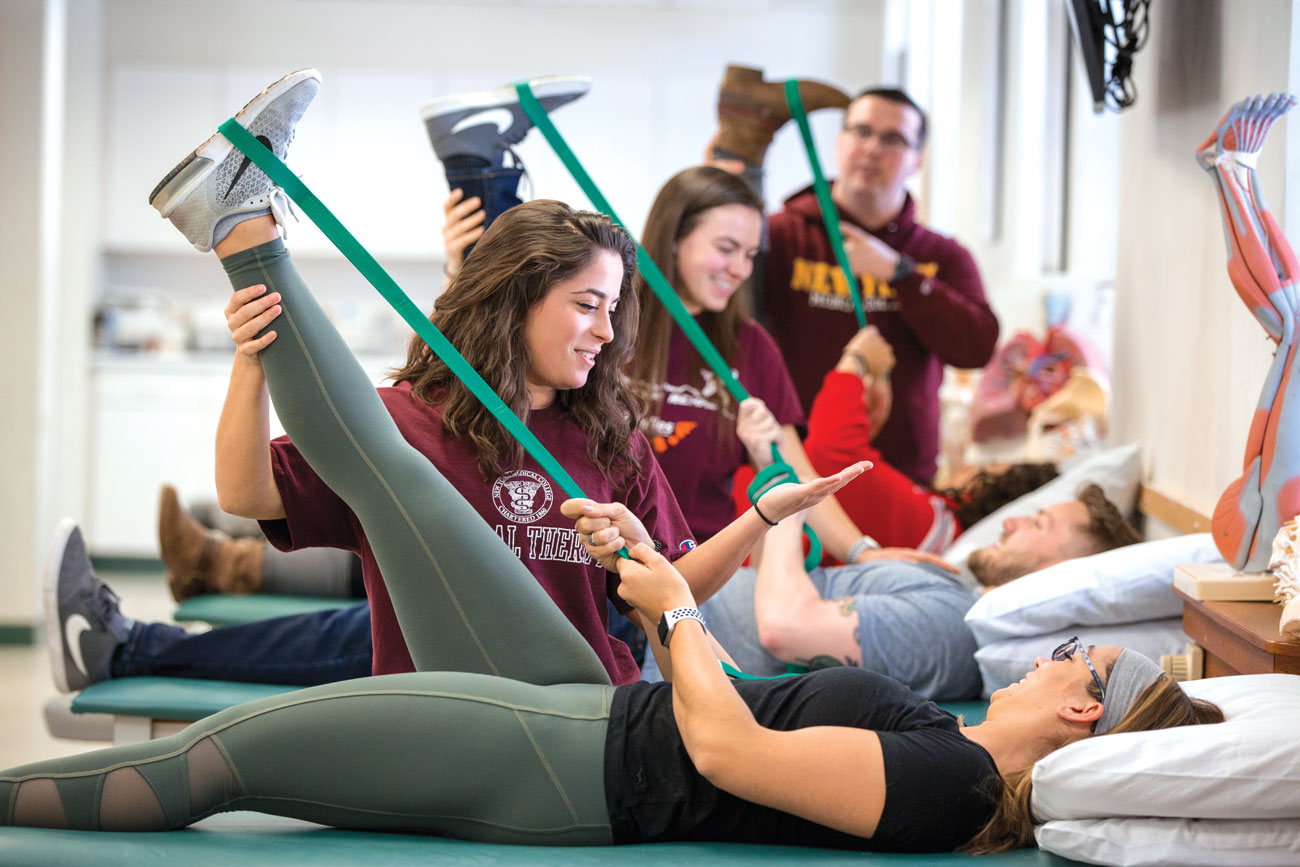
Mission
New York Medical College (NYMC), a member of the Touro College and University System, is a health sciences College whose purpose is to educate clinical and public health professionals as well as researchers, to conduct biomedical and population-based research. Through its faculty and affiliated partners, the College engenders a diverse and inclusive community that promotes an atmosphere of excellence, scholarship and professionalism.
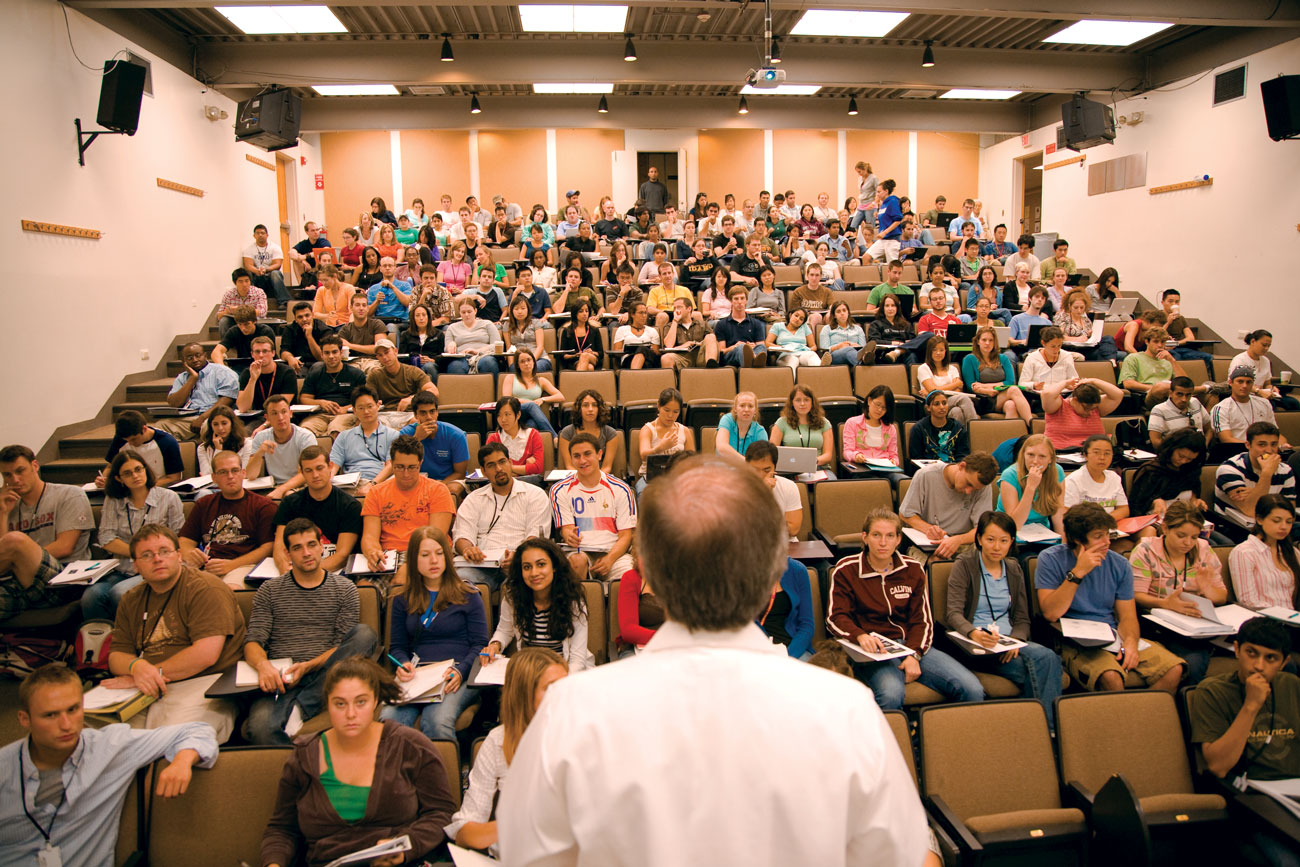
Vision
NYMC will promote health science education and research; preparing and empowering the next generation of researchers and health care leaders to advance human health and well-being.
Core Values
At NYMC, we believe success in fulfilling our mission begins with the commitment we have to our values. These guiding values consist of:
- Excellence: We believe in holding ourselves to high professional and academic standards. We are therefore committed to pursuing ambitious goals and quality assurance in our intellectual, educational and programmatic endeavors. We strive not to rest on our accomplishments, but rather to build on them to set new standards in our fields.
- Human Dignity: We believe that before health professionals see patients, they must first see their patients, and themselves, as people. This commitment to acknowledging and appreciating the entirety of a person will lead our students to develop professional and personal integrity
- Intellectual Curiosity: We believe in the importance of a life-long commitment to intellectual curiosity that encourages individuals to not only seek to push beyond boundaries of research but also to question commonly-held assumptions. By providing an atmosphere where students and faculty are encouraged to seek out, master and respond, to the latest advances in their fields of study, we can further health sciences research and patient care.
- Service: We believe that health care education and research should not be pursued solely for the sake of intellectual edification. Rather, we are committed to the belief that health care education should be used to improve the lives of patients and benefit the communities we serve.
- Integrity: We believe that acting on our values in pursuit of our mission will keep us both true to our mission and to our values. We strive not only for a culture that complies with our norms and policies. We strive to embed a culture of integrity into everything we do.
Champion Excellence in Education
Excellence in education is embedded in our mission. The College and each school is dedicated to ensuring a culture of innovation and continuous quality improvement throughout our academic programs, including opportunities for research, scholarship and clinical practice, with dedicated and empowered faculty.
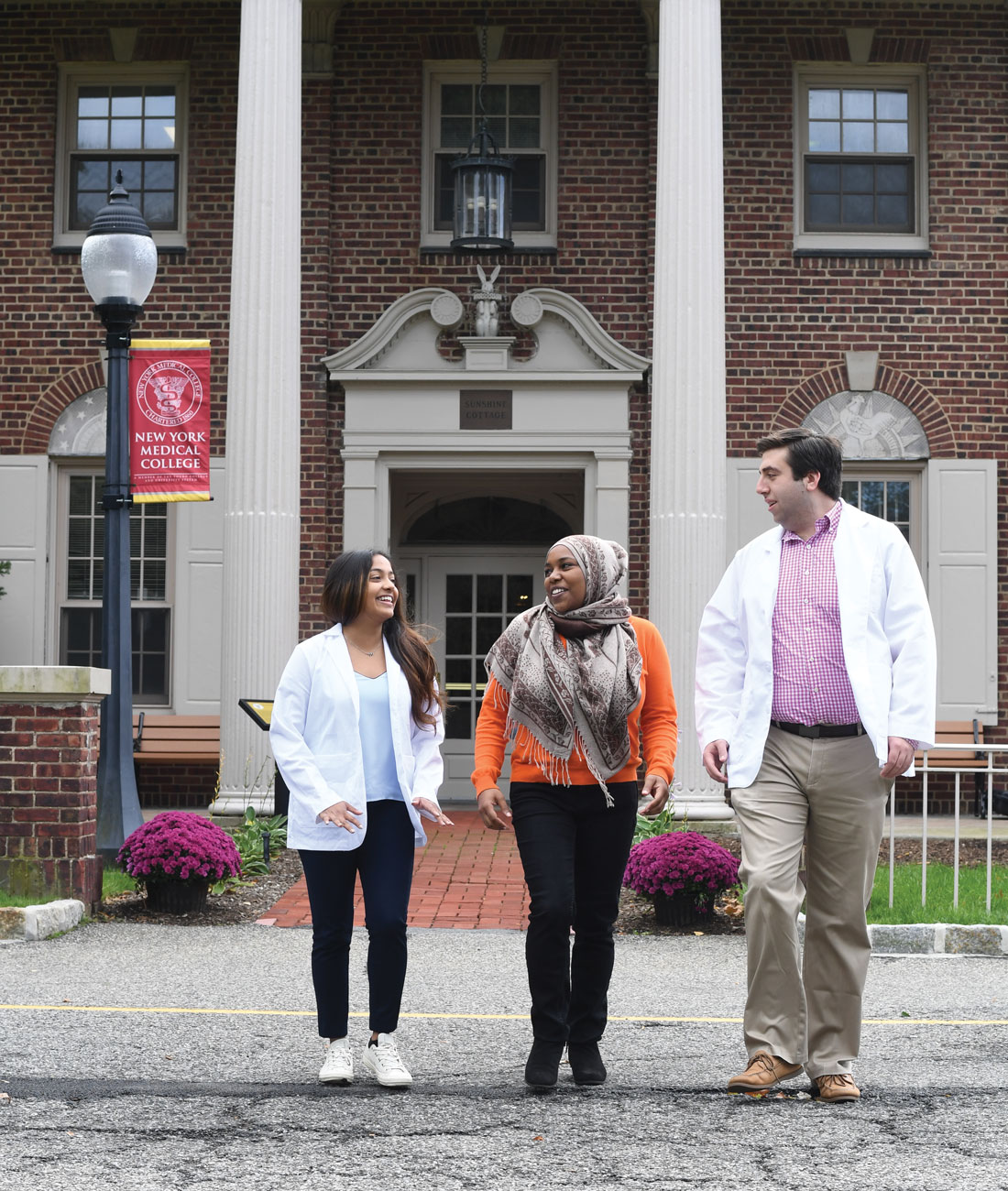
The College will continue to strengthen student support, including academic services and scholarships, available to students in all schools. NYMC has an honorable history of respect and dignity. We commit ourselves to building productively on this foundation. This includes addressing health care and other disparities in our educational programs where appropriate. To achieve this goal, we will enhance access; encourage innovation; create best-in-class research opportunities; promote interdisciplinary collaboration; provide exceptional clinical experiences; promote faculty achievement; and provide a collaborative environment—in order to prepare our entire student community to become tomorrow’s biomedical innovators and health care leaders.
Goal 1
Offer graduate and professional programs that support the NYMC mission: to educate biomedical scientists and prepare them for careers as medical professionals, researchers, teachers, innovators and leaders, in an atmosphere of excellence, scholarship and integrity.
Subgoal 1:
Evaluate and assess academic programs to ensure that they are meeting the needs of our students, are responsive to market needs and are sustainable and competitive.
Subgoal 2:
Develop programs and new degrees to allow students to individualize their education and advance their careers.
Subgoal 3:
Create interdisciplinary research centers of excellence, bringing together faculty and students within each of the basic science disciplines and relevant faculty and students from all the schools on our campus.
Subgoal 4:
Develop and enhance online learning systems for all schools with sufficiently trained support personnel to allow cross-institutional teaching and extend the College’s reach to a larger target population.
Subgoal 5:
Enhance student research opportunities.
Goal 2
Attain sufficient numbers and types of clinical education experiences to meet our current student needs that match increases in some of our class sizes anticipated over the next five years.
Subgoal 1:
Collaborate with Touro to establish a system-wide Office of Clinical Affiliations with a staff to include an administrator and support staff person.
Subgoal 2:
Increase the number and types of affiliate sites and clinical education experiences for our students to be able to meet the needs of all programs.
Subgoal 3:
Strengthen our relationships with our current clinical education partners to promote greater numbers of clinical experiences and support new initiatives and improvements.
Subgoal 4:
Collaborate with Touro to create an interprofessional clinical education center.
Goal 3
Ensure there are sufficient faculty with appropriate expertise and faculty development support to carry out the mission of the College.
Subgoal 1:
Perform an evidenced-based faculty needs assessment for academic and research programs.
Subgoal 2:
Improve recruitment and retention of exceptional faculty; including transition planning for critical education and research faculty as senior faculty members retire.
Subgoal 3:
Define faculty performance metrics for clinical service, research, teaching and service. This includes consideration of how to transparently and fairly evaluate full-time effort for different faculty tracks.
Subgoal 4:
Develop an academy of educators that serves all NYMC schools.
Goal 4
Enhance overall student success through student services that promote academic support, career readiness, student health and wellness and an inclusive community that engenders a sense of belonging for all students.
Subgoal 1:
Assess and expand student career development opportunities aimed at improving career outcomes and successful transition into the workforce.
Subgoal 2:
Provide academic support initiatives in partnership with faculty to include programs that provide support and intervention strategies for student populations who may have unique needs at different stages of their academic journey. Provide robust student advising and mentorship programs.
Subgoal 3:
Provide guidance and support for health and wellness to the entire student community.
Subgoal 4:
Provide a robust student financial advising initiative.
Subgoal 5:
Assess and develop opportunities for student engagement and initiatives that foster an environment of inclusivity, respect and belonging—that serve to enhance the overall student experience.
Promote Biomedical Research and Innovation
Accelerate and support innovative research that improves public health by:
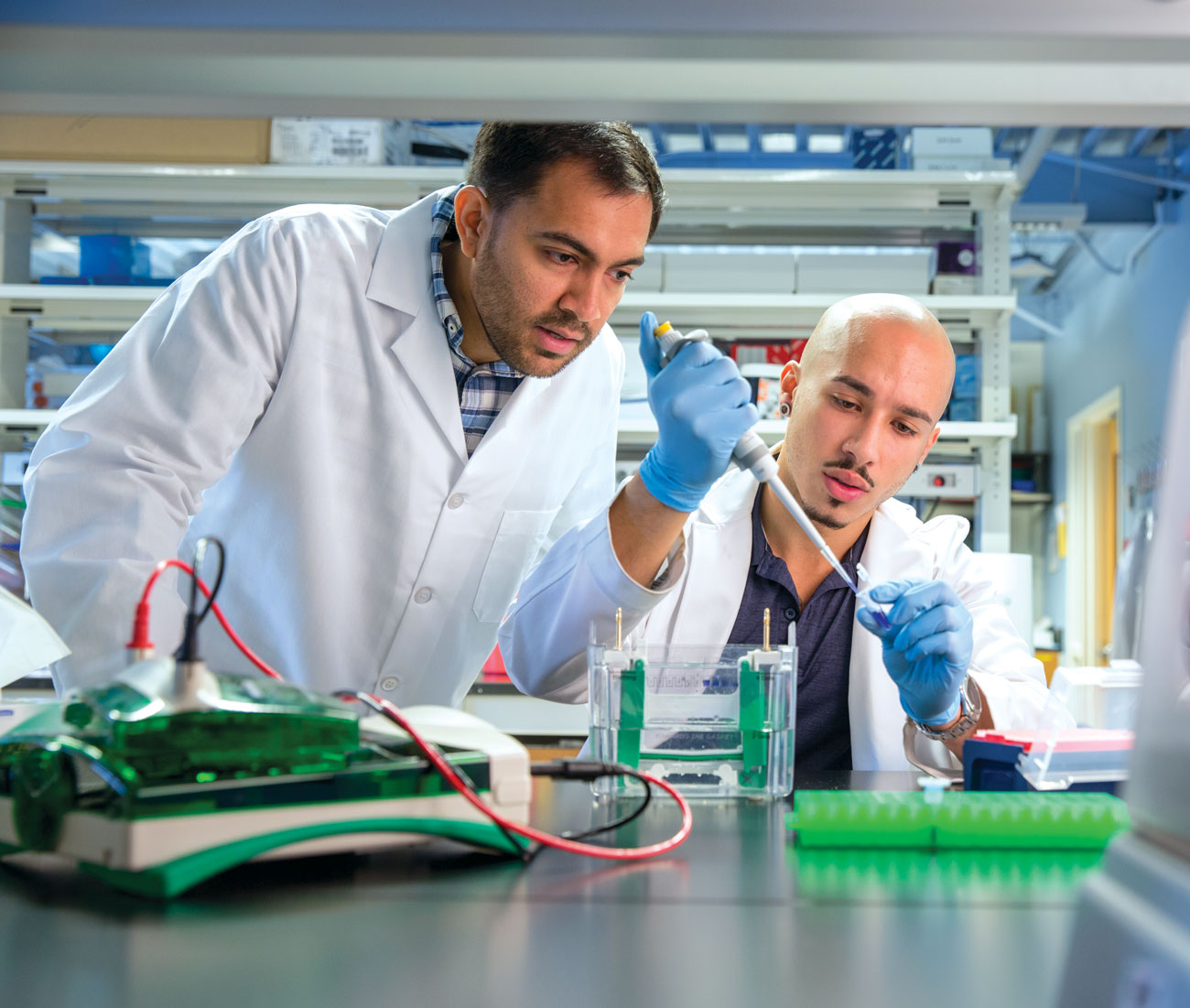
- exploring new frontiers in clinical, translational and basic research; develop new research initiatives that build on our current strengths and recruit and retain outstanding faculty.
- striving to create new, as well as strengthen existing, strategic partnerships to enhance and expand research opportunities.
- strategically improving research infrastructure to ensure faculty and students have access to research cores critical for bench-to-bedside translational research to ensure excellence in both the conduct and training of biomedical research.
Goal 1
Enhance biomedical, translational, clinical science and public health research.
Subgoal 1:
Identify priority research areas that promote collaborative research, as well as strengthen NYMC competitiveness to secure grant funding and other extramural funding opportunities.
Subgoal 2:
Improve retention of successful junior faculty.
Subgoal 3:
Build strategic partnerships with clinical and biomedical affiliates.
Subgoal 4:
Improve the research infrastructure including core facilities identified as essential, both in terms of equipment and appropriate trained staff/directors.
Subgoal 5:
Strategically enhance support for existing investigators to promote extramural research funding as well as innovative expansion into new research areas.
Elevate Transparency in Governance and Commitment to Ethics, Mission, Vision and Core Values
With a commitment to transparency in governance and an unyielding adherence to ethics, the College has made it an institutional priority to develop, nurture and sustain an environment that embodies transparent communications and promotes participation by every member of the College community.
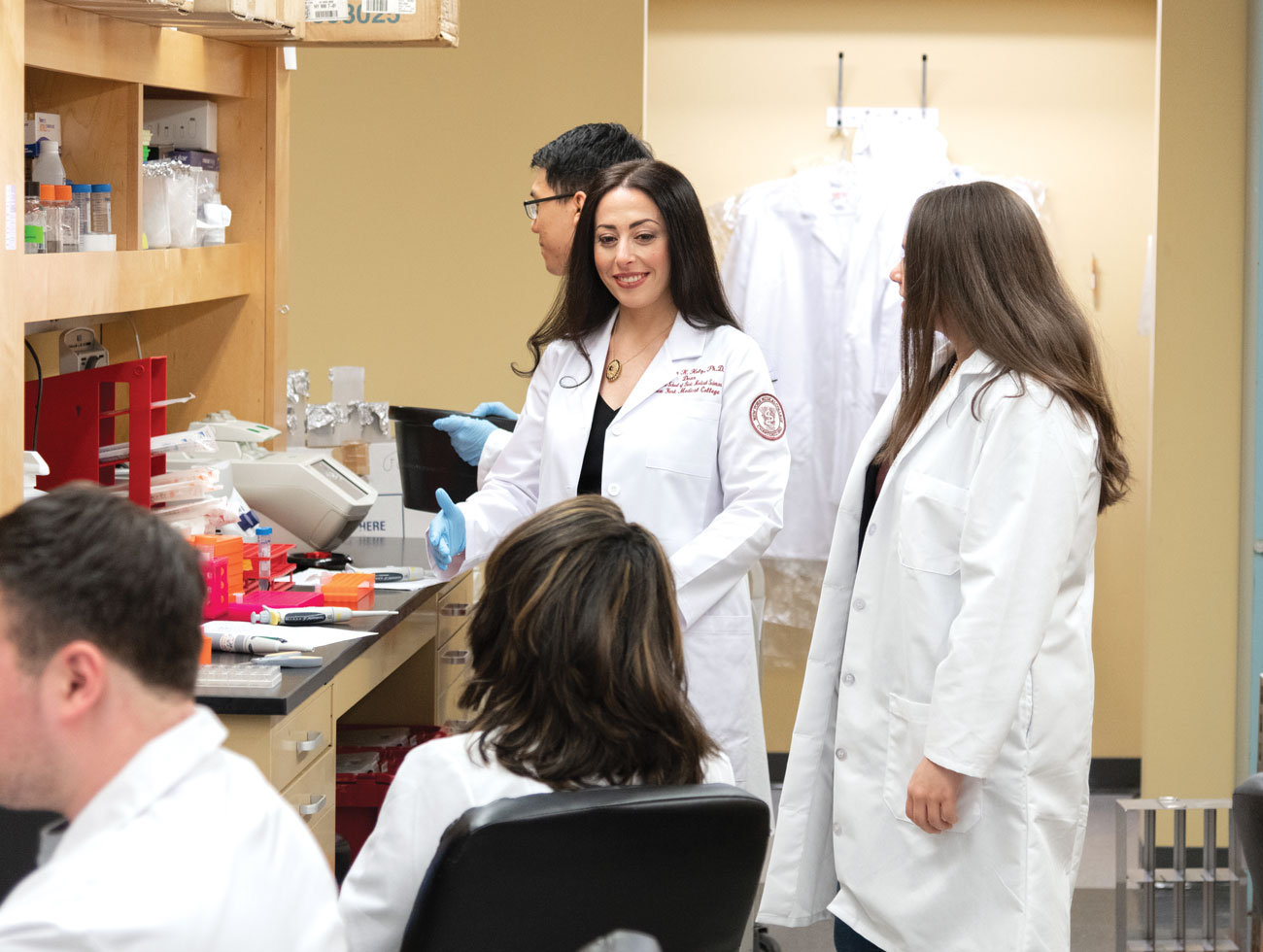
The College will do so by seeking to ensure an institutional structure which supports open channels of communication and bi-directional governance—this strategic goal is intended to maintain transparency and adherence to the College’s ethics, mission, vision and core values—to ultimately elevate institutional excellence through leadership and professionalism for students, faculty, and staff.
Goal 1
Create and sustain a culture of participatory and consultative governance and transparency in our communications and decision-making.
Subgoal 1:
Provide a clear statement of the College’s organizational structure.
Subgoal 2:
Establish clearly defined, effective and inclusive participatory and consultative governance structure.
Subgoal 3:
Engage in comprehensive and sustained organizational assessment, including both academic and non-academic units, to promote continuous quality improvement.
Subgoal 4:
Promote open dialogue at NYMC to embody a culture of transparency and openness.
Subgoal 5:
Develop, review and update an emergency preparedness plan for NYMC and Touro College of Dental Medicine (TCDM).
Goal 2
Foster a campus culture that supports the talent, development, engagement, health and well-being of faculty and staff achieving high performance and positive outcomes for the College.
Subgoal 1:
Attract, support and retain a productive workforce.
Subgoal 2:
Develop a competitive compensation framework.
Subgoal 3:
Foster an active, engaged campus community.
Focus on Community Outreach
NYMC is committed to helping address important issues faced by the populations we serve, including health care disparities and social determinants of health, while providing services to our community and staying true to the College’s legacy and commitment to underserved populations.
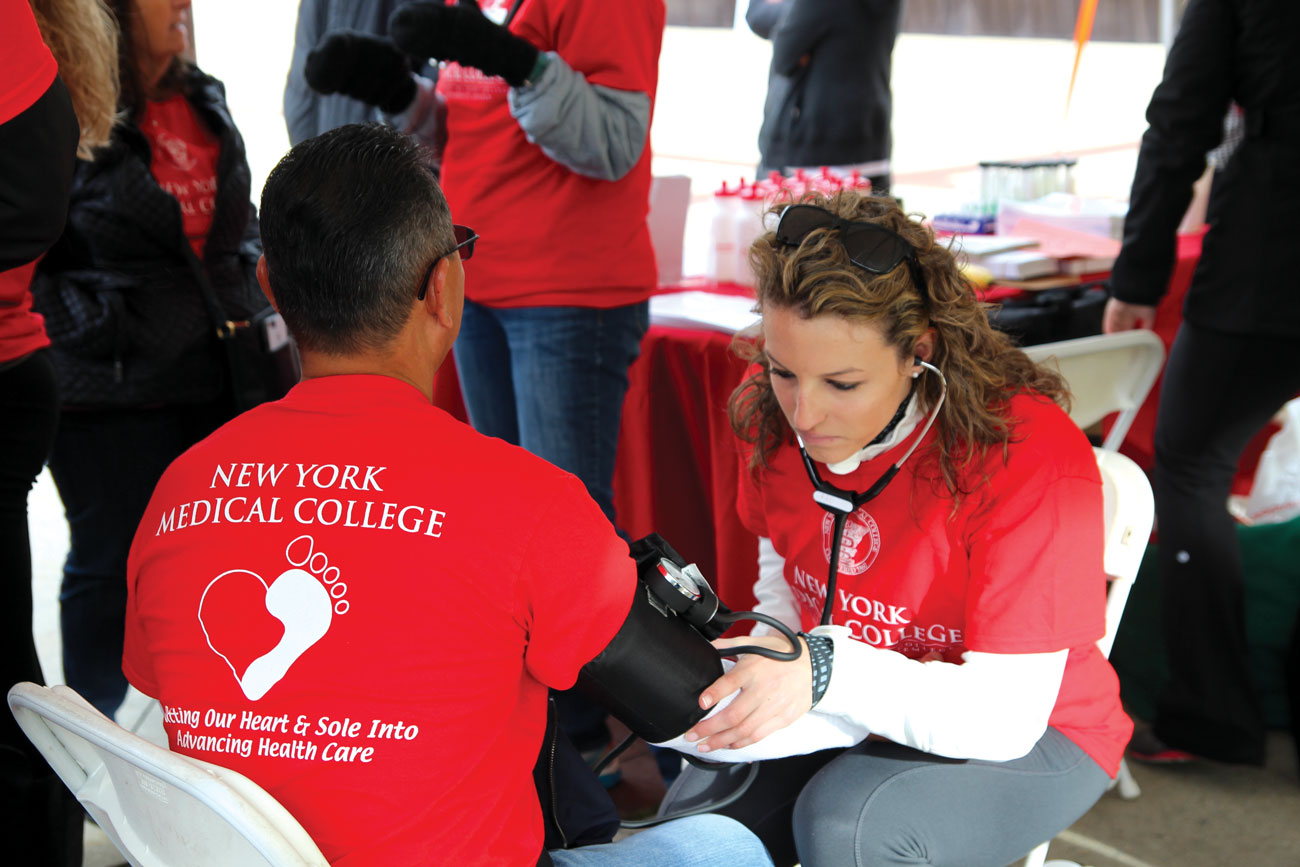
We will promote collaboration among learners, College employees and community partners, to create innovative programs and services to maximize physical, mental and social well-being of the community throughout Westchester County, the Hudson Valley and the New York metropolitan area.
Goal 1
Foster community engagement and outreach programs to enhance student learning, drive NYMC’s brand and program awareness and maximize well-being in the communities we serve.
Subgoal 1:
Enhance community outreach as it relates to the co-curricular programs for each of NYMC’s schools.
Subgoal 2:
Increase NYMC’s brand awareness.
Subgoal 3:
Enhance community outreach as it relates to increasing philanthropy and alumni relations.
Subgoal 4:
Enhance community outreach as it relates to increasing government and community relations.
Strategic Planning, Resource Development and Institutional Improvement
The College will manage resources to ensure sufficient support of programs and services that strengthen our institutional mission and objectives.
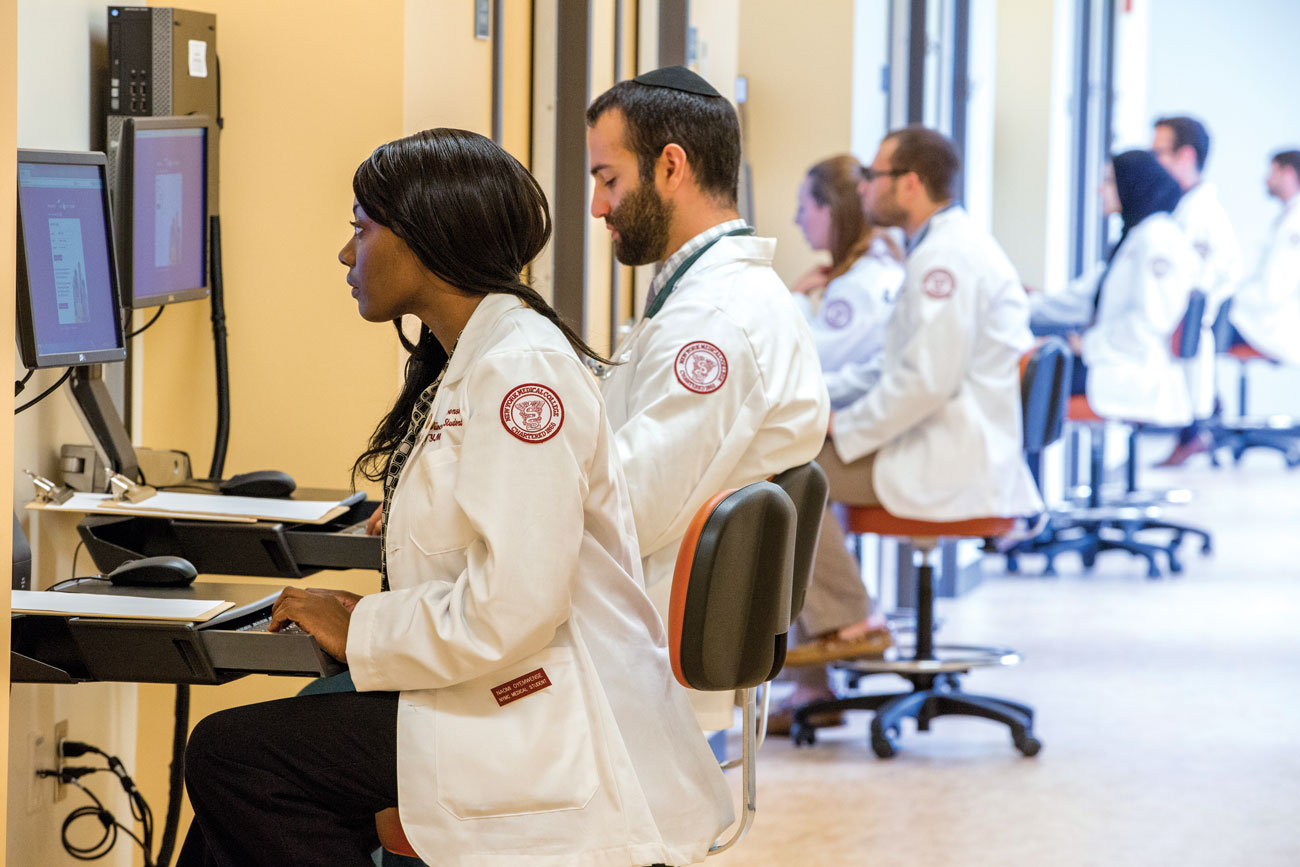
This goal builds upon NYMC’s already strategically-disciplined financial planning process, which aligns the allocation of College resources with the institution’s priorities. Looking toward the next five years and beyond, the College will focus on investment strategies that generate value and growth to ultimately enhance the economic stability and sustainability of NYMC.
Goal 1
Enhance the economic stability and sustainability of NYMC.
Subgoal 1:
Establish and maintain multiple, diversified mission-based revenue streams.
Subgoal 2:
Expand and develop income-generating small business units (SBUs).
Subgoal 3:
Increase funding (sources, quantity) of basic science, clinical and translational research. Integrate research successes and areas of research strength with College branding and fund raising.
Subgoal 4:
Optimize enrollment in all NYMC schools.
Goal 2
Pursue investment strategies that generate value and growth in NYMC’s tripartite mission of excellence in scholarship, research and clinical care.
Subgoal 1:
Ensure sufficient faculty with appropriate expertise, space and faculty development support to carry out the educational/research missions of the College.
Subgoal 2:
Advance BioInc@NYMC and TruMada initiatives.
Subgoal 3:
Expand capacity and programming within the Clinical Skills and Simulation Center.
Subgoal 4:
Strategically augment Health Sciences Library resources important for the College mission.
Subgoal 5:
Increase funds committed to student scholarships.
Goal 3
Provide a campus environment that inspires innovative teaching, effective learning and exceptional research for the current and future NYMC community.
Subgoal 1:
Develop and maintain a safe, clean, functional and welcoming campus environment.
Subgoal 2:
Develop NYMC’s informational and educational technology infrastructure.
Subgoal 3:
Promote sustainability and green initiatives across the campus.
Conclusion
This strategic plan is built on an objective assessment of the previous 2015-2020 strategic plan; both our successes as well as lessons learned. It builds on NYMC’s long history of education, research, health care and public health. The college-wide strategic planning process identified new opportunities and strategic plans for the next five years. Special attention was paid during the strategic planning process to ensure it not only promotes the College mission and goals, but that it includes tactics and defensible assessments to ensure that we are able to responsibly deliver on those goals as well as assess our progress in real-time to allow for adjustments as needed while continuing to successfully achieve our mission. Creating a roadmap for the next five years, this strategic plan keeps NYMC on a path for success.
Over the next five years, we will further establish NYMC as a leading health sciences institution in the U.S. We will achieve this by investing in and empowering faculty and students to promote their success. This includes strategic initiatives to promote and build sustainable and competitive research, as well as promote and build areas of research excellence and partnerships, that provide educational research opportunities for students— providing opportunities to promote College branding and fundraising based on research successes and areas of strength recognizable to the public. We will strive for enhanced transparency and open communications so that our entire community is invested in working toward our institutional vision, mission and goals. We will also increase our focus on community outreach that will help address today’s important issues including health disparities and social determinants of health. To drive these initiatives, we will continue to cultivate support through strengthening ties with our community of alumni and trusted community of donors, leverage our expertise in research to pursue grant funding, achieve excellence in financial performance and manage our resources in a deliberate manner in support of programs and services aligned with our mission, vision and core values.
As we implement this plan, we will monitor and measure our progress—as we nourish partnerships with the entire NYMC community that brought this plan to fruition and will help achieve its success.
Committees
Planning Committee
LEADERSHIP
- Alan Kadish, M.D.
President - Edward C. Halperin, M.D., M.A.
Chancellor and Chief Executive Officer
CHAIR
- Jennifer Riekert, M.B.A.
Vice President of Communications and Strategic Initiatives
CO-CHAIR
- Dana G. Mordue, Ph.D.
Associate Professor of Microbiology and Immunology, Secretary of the NYMC Faculty Senate, Vice Chancellor for Middle States Accreditation
Executive Committee
- Salomon Amar, D.D.S., Ph.D.
Vice President for Research, Professor of Pharmacology and Professor of Microbiology and Immunology - Robert W. Amler, M.D., M.B.A.
Dean of School of Health Sciences and Practice (SHSP); and Vice President for Government Affairs - Adam E. Block, Ph.D.
Assistant Professor of Public Health: Division of Health Policy and Management - Bess J. Chazhur, M.S.
Chief Development Officer and Executive Director of Alumni Relations - Dee DelBello
Member, Board of Trustees - Mill Etienne, M.D. ’02, M.P.H., FAAN, FAES
Vice Chancellor, Assistant Dean for Student Affairs and Associate Professor of Neurology, School of Medicine (SOM) - Celia S. Freeman, M.B.A.
Assistant Dean for Continuous Quality Improvement and Strategic Planning, SOM - Renee Garrick, M.D.
Vice Dean of the SOM and Professor of Clinical Medicine; and Chief Medical Officer at Westchester Medical Center - Adam Hammerman, M.B.A.
Vice President and Chief Financial Officer - Marina K. Holz, Ph.D.
Dean of the Graduate School of Basic Medical Sciences (GSBMS) - Nicholas S. Janiga, J.D.
Vice President, Chief Counsel and Assistant Corporate Secretary - Jennifer L. Koestler, M.D.
Senior Associate Dean for Medical Education, SOM - Joseph Mark
Chair of the Board of Trustees - Ronnie Myers, D.D.S.
Dean of Touro College of Dental Medicine, Professor of Dental Medicine - Jerry L. Nadler, M.D., MACP, FAHA, FACE
Dean of the SOM - Ronald F. Poe
Member of the Board of Trustees - Patricia E. Salkin, J.D.
Touro Provost, Graduate and Professional Divisions - Patric K. Stanton, Ph.D.
Professor of Cell Biology and Anatomy, GSBMS - Akshitha Yarrabothula
SOM Student Representative
Educational Excellence Sub-Committee
CO-CHAIRS
- Robert W. Amler, M.D., M.B.A.
Vice President for Government Affairs and Dean of School of Health Sciences and Practice (SHSP) - Marina K. Holz, Ph.D.
Dean of the Graduate School of Basic Medical Sciences (GSBMS) - Jerry L. Nadler, M.D., MACP, FAHA, FACE
Dean of the School of Medicine (SOM)
MEMBERS
- Ira Bedzow, M.A., Ph.D.
Associate Professor of Medicine, SOM, and UNESCO Chair of Bioethics – NYMC - Janet P. Dolot, M.S., D.P.T., Dr.P.H. ’14, PT, OCS
Chief, Division of Physical Therapy, Associate Professor of Physical Therapy, and Program Director, Doctor of Physical Therapy - Jan Geliebter, Ph.D.
Professor, Department of Microbiology and Immunology and Otolaryngology Resident Research Coordinator, Department of Otolaryngology; Course Director, Medical Microbiology Regional Vice President, Executive Committee of Faculty Senate Member, Executive Committee of Education and Curriculum - Eileen Hunsaker, M.S., CCC-SLP
Assistant Professor of Speech-Language Pathology, SHSP - Tetyana Cheairs (Kobets), M.D., M.S.P.H.
Assistant Dean for Ph.D. Programs, GSBMS, Assistant Professor of Pathology - Jennifer L. Koestler, M.D.
Senior Associate Dean for Medical Education, SOM - Kenneth M. Lerea, Ph.D
Assistant Dean for Master of Science Programs, GSBMS, Professor of Cell Biology and Anatomy - Pamela Ludmer, M.D., M.M.E.L.
Associate Dean for Curriculum Integration, SOM - Michael J. Majsak, P.T., Ed.D.
Associate Professor and Chair, Department of Physical Therapy, SHSP - Richard G. McCarrick, M.D.
Vice Dean for Graduate Medical Education and Continuing Medical Education, SOM, Vice Chancellor for College Student Services - Joseph F. Morales, D.D.S.
Chair and Professor of Clinical Dental Medicine, SOM - Karen M. Murray, M D ’99
Associate Dean for Admissions for the SOM - Ronnie Myers, D.D.S.
Dean of Touro College of Dental Medicine, Professor of Dental Medicine - Kristen A. Nestler, M.S.
Assistant Director of Admissions and Information Management, SOM - Michelle Novotny, M.A.
Associate Dean for Admissions and Enrollment Management, SHSP - Matthew A. Pravetz, OFM, Ph.D. ’88
Professor Emeritus of Cell Biology and Anatomy - Donald Risucci, Ph.D.
Assistant Dean for Assessment and Evaluation, SOM - Valerie Romeo-Messana
Director of Admissions, GSBMS - Anthony M. Sozzo, M.S.Ed., M.A.
Director of Student Financial Planning and Student Activities / Associate Dean for Student Affairs, SOM - Kathryn Spanknebel, M.D., FACS
Senior Associate Dean for Faculty Affairs, SOM; Vice Chair for Education and Director, Undergraduate Surgical Education, Department of Surgery - Catherine Yankou, M.P.H. ’07
Recruiter and Advisor, GSBMS
Research and Innovation Sub-Committee
CHAIR
- Salomon Amar, D.D.S., Ph.D.
Vice President for Research, Professor of Pharmacology and Professor of Microbiology and Immunology
VICE-CHAIR
- Mitchell S. Cairo, M.D.
Professor of Pediatrics, Medicine, Pathology, Microbiology and Immunology and of Cell Biology and Anatomy
MEMBERS
- Paul Michael Arnaboldi, Ph.D.
Assistant Professor of Microbiology and Immunology - Doris J. Bucher, Ph.D.
Associate Professor of Microbiology and Immunology - Joseph D. Etlinger, Ph.D.
Professor and Chair of Cell Biology and Anatomy - Cory Gaylets
GSBMS Student Representative - Diane E. Heck, Ph.D.
Associate Dean for Research and Professor, Department of Public Health - Marina K. Holz, Ph.D.
Dean of the GSBMS - Xiu-min Li, M.D.
Professor of Microbiology and Immunology - Jerry L. Nadler, M.D., MACP, FAHA, FACE
Dean of the SOM - Padraic B. Reynolds, M.P.H. ’14
Associate Dean for Academic Administration for the SOM - Michal Schwartzman, Ph.D.
Professor and Chair of Pharmacology - Michael P. Shakarjian, Ph.D.
Assistant Professor and Program Director, M.P.H. Environmental Health Science Studies - Jerold Volk
Director of Development - Michael Wolin, Ph.D
Professor of Physiology - Gary P. Wormser, M.D.
Professor of Medicine
Governance, Ethics, Mission, Vision and Core Values Sub-Committee
CHAIR
- Nicholas S Janiga, J.D.
Vice President, Chief Counsel and Assistant Corporate Secretary
VICE-CHAIR
- Dana Mordue, Ph.D.
Associate Professor of Microbiology and Immunology, Secretary of the NYMC Faculty Senate, Vice Chancellor for Middle States Accreditation
MEMBERS
- Ira Bedzow, M.A., Ph.D.
Associate Professor of Medicine, SOM, and UNESCO Chair of Bioethics – NYMC - Vilma Bordonaro, M.B.A.
Chief of Staff - Keya Desai, M.P.H. ’20
SHSP Student Representative - Maureen Kennedy, B.A., B.S., M.S., Dr.P.H.
Division Director, Professor of Epidemiology, SHSP - Edmund F. La Gamma, M.D. ’76
Professor of Pediatrics, Division of Newborn Medicine; Professor of Biochemistry and Molecular Biology, Director, Fellowship Program and Division Chief of Neonatology - Ronald F. Poe
Member of the Board of Trustees - Jennifer Riekert, M.B.A.
Vice President of Communications and Strategic Initiatives - Eileen Romero, M.B.A.
Registrar - Denise C. Tahara, M.B.A., M. Phil., Ph.D.
Associate Professor Division Director, Health Policy and Management, SHSP - Carl I. Thompson
Professor of Physiology and President of the Faculty Senate
Community Engagement Sub-Committee
CHAIR
- Bess J. Chazhur, M.S.
Chief Development Officer and Executive Director of Alumni Relations
VICE-CHAIR
- Amy Ansehl, D.N.P., R.N., FNP-BC
Associate Dean for Student Experience for the SHSP, Associate Professor Environmental Health Sciences, Executive Director, Partnership for a Healthy Population
MEMBERS
- Tara Alfano
Director of Alumni Relations - Dee DelBello
Member of the Board of Trustees - Nicholas R. Ferreri, Ph.D.
Professor of Pharmacology, Course Director, Molecular Pharmacology - Traci Furbert Gardner, M.D.
Clinical Assistant Professor of Pediatrics and Director of Community Engagement and Ambulatory Preceptor Experience - Penny Liberatos, M.A., M.Phil., Ph.D.
Assistant Professor and Director, M.P.H. Studies Health Behavior and Community Health - Amanda Muth
Special Assistant for Government Affairs - Leonard J. Newman, M.D. ’70
Professor and Chair of the Department of Pediatrics, SOM - Dana Pagano
Administrative Coordinator at the Center for Disaster Medicine - Jeffrey Patrick, M.P.H. ’20
SHSP Student Representative - Mary M. Petzke, Ph.D.
Assistant Dean for Medical Student Research, Assistant Professor of Microbiology and Immunology - Julio A. Rodriguez-Rentas, M.A.
Director of Communications - Anthony M. Sozzo, M.S.Ed.
Director of Student Financial Planning and Student Activities / SOM Associate Dean for Student Affairs - Katharine Yamulla, M.A.
Director of the Clinical Skills and Simulation Center and Senior Director of Competency Based Assessment and Clinical Skills Education
Planning, Resources, and Institutional Improvement Sub-Committee
CHAIR
- Adam Hammerman, M.B.A.
Vice President and Chief Financial Officer
VICE-CHAIR
- Christopher Leonard, Ph.D.
Professor and Interim Chair of Physiology
MEMBERS
- Marie T. Ascher, M.S., M.P.H.
The Lillian Hetrick Huber Endowed Director of the Health Sciences Library, Assistant Professor of Health Sciences Library and Family and Community Medicine, SOM, and Adjunct Assistant Professor of Public Health, SHSP - David E. Asprinio, M.D.
Chair and Professor of Clinical Orthopedic Surgery, SOM - Katherine Dillon Smith, M.S.W.
Director of Student and Residential Life - Celia S. Freeman, M.B.A.
Assistant Dean for Continuous Quality Improvement and Strategic Planning, SOM - Bonnie Gurran-Heindl
Budget Officer - Padraic B. Reynolds, M.P.H. ’14
Associate Dean for Academic Administration, SOM - Amy Roberts
Director of Advancement Services - Lori Solomon, M.D. ’99, M.P.H. ’09
Professor and Chair of the Department of Family and Community Medicine, SOM - Yvette D. Woods
Administrator and Coordinator for Special Projects, Department of Financial Operations - Katharine Yamulla, M.A.
Senior Director of Competency Based Assessment and Clinical Skills Education and Director of the Clinical Skills and Simulation Center


